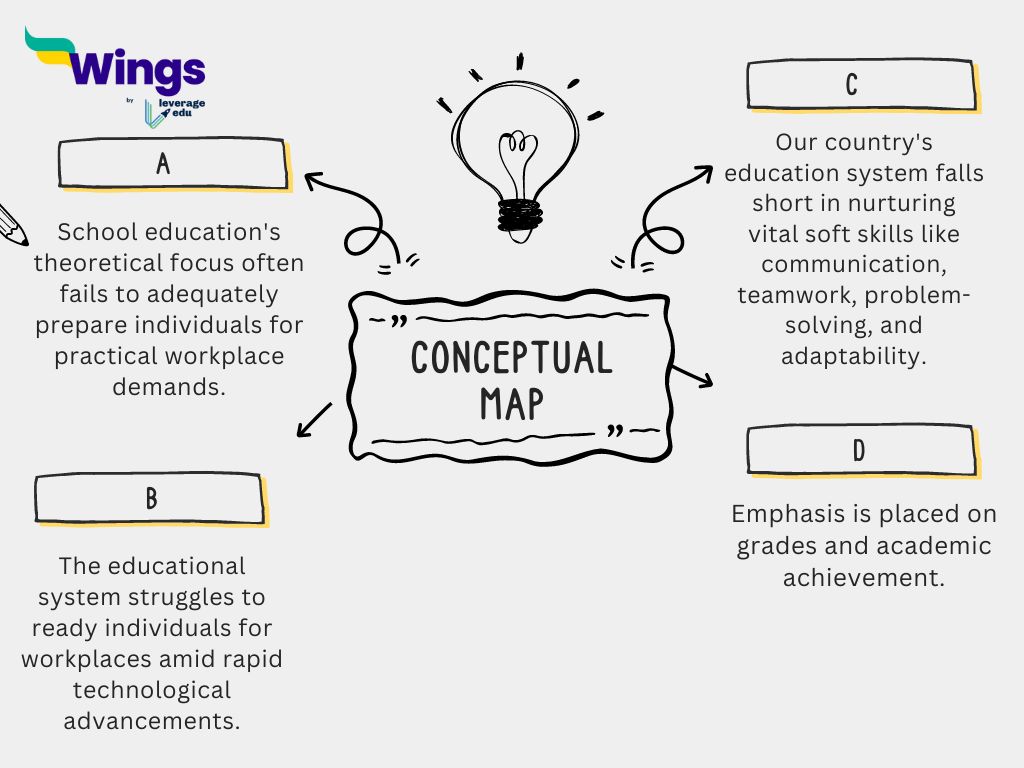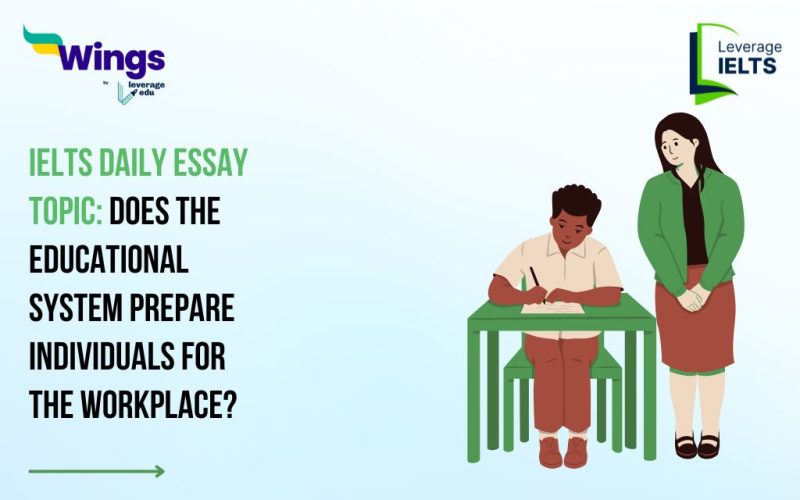Brainstorming Ideas
Refer to the following brainstorming ideas to get a solid understanding of the answer.
Reasons for disagreement:
- The school education is very theoretical and lacks practical application.
- Rapid advancement in technological change presents challenges.
- Fails to develop soft skills like communication, teamwork, problem-solving and adaptability in people.
- Emphasis is placed on grades and academic achievement.

Q. Does the educational system prepare individuals for the workplace? Why or why not?
Ans. The question of whether the education system adequately prepares individuals for the workplace is a topic that has been highly debated by educators, employers and students alike. I believe that today’s education system, despite its merits, often falls short of preparing individuals for the workplace and there are several reasons for this.
Firstly, the educational system is very theoretical and lacks practical application. For instance, a student who is studying engineering may understand the principles of how bridges are being constructed, but without hands-on practical experience, they may find it very difficult to apply this knowledge in a real-world context. This gap between academic knowledge and practical application can leave students very ill-prepared for the demands of the workplace.
Secondly, the rapid advancement in technological change can present significant challenges. The curriculum of schools and universities often struggles to keep up with the latest changes in technology and industry practices. For example, a student who is studying information and technology may learn about programming languages or software that can become obsolete by the time they enter their workplace. This constant evolution requires individuals to be lifelong learners as a skill can not always be fostered by the traditional educational system.
Thirdly, the current educational system often fails to develop soft skills in people that are often required in the workplace. These include things like communication, teamwork, problem-solving and adaptability. While all of these skills can be developed with the help of extracurricular activities, they are often not given the same emphasis as academic achievements within the classroom. Last but not least, the immense emphasis placed on grades and academic achievement can create a narrow definition of success. This can lead to a lack of creativity and innovation, skills that are highly appreciated in the modern workplace. For example, a student who is always taught to follow a certain set of procedures to achieve the correct answer will always struggle in a workplace that always appreciates innovative thinking and problem-solving.
To conclude, while the education system does lay the foundation of knowledge and skills, it often does not fully prepare individuals for the realities of the workplace.
Analysis
Paraphrased Statement: The question of whether the education system adequately prepares individuals for the workplace is a topic that has been highly debated by educators, employers and students alike.
Thesis Statement: I believe that today’s education system, despite its merits, often falls short of preparing individuals for the workplace and there are several reasons for this.
Body Paragraph 1-Topic Sentences: Firstly, the educational system is very theoretical and lacks practical application.
Body Paragraph 1- Supporting Reasons and Explanations: For instance, a student who is studying engineering may understand the principles of how bridges are being constructed, but without hands-on practical experience, they may find it very difficult to apply this knowledge in a real-world context. This gap between academic knowledge and practical application can leave students very ill-prepared for the demands of the workplace.
Body Paragraph 2- Topic sentence: Secondly, the rapid advancement in technological change can present significant challenges. The curriculum of schools and universities often struggles to keep up with the latest changes in technology and industry practices.
Body paragraph 2- Supporting Reasons and Explanations: For example, a student who is studying information and technology may learn about programming languages or software that can become obsolete by the time they enter their workplace. This constant evolution requires individuals to be lifelong learners as a skill can not always be fostered by the traditional educational system.
Body Paragraph 3- Topic sentence: Thirdly, the current educational system often fails to develop soft skills in people that are often required in the workplace. These include things like communication, teamwork, problem-solving and adaptability.
Body paragraph 3- Supporting Reasons and Explanations: While all of these skills can be developed with the help of extracurricular activities, they are often not given the same emphasis as academic achievements within the classroom. Last but not least, the immense emphasis placed on grades and academic achievement can create a narrow definition of success. This can lead to a lack of creativity and innovation, skills that are highly appreciated in the modern workplace. For example, a student who is always taught to follow a certain set of procedures to achieve the correct answer will always struggle in a workplace that always appreciates innovative thinking and problem-solving.
Conclusion: To conclude, while the education system does lay the foundation of knowledge and skills, it often does not fully prepare individuals for the realities of the workplace.
Vocabulary in Use
| Word | Meanings |
| Falls Short | Fails to meet the expected or desired standard. |
| Hands-On | Involves direct, practical engagement in a task. |
| Ill-Prepared | Not adequately ready to handle a situation. |
| Rapid Advancement | Swift progress or development in a field. |
| Obsolete | No longer useful due to the emergence of something newer and better. |
| Fostered | Encourages growth of ideas or feelings, or temporarily cares for a child. |
| Create A Narrow Definition | Establish a very specific and limited scope definition. |
Linkers and Connectors Used:
Following are the linkers and connectors used:
- Firstly
- For instance
- Secondly
- For example
- Thirdly
- While
- Last but not the least
- To conclude
Are you preparing for IELTS? Check out this video to improve your writing skills for the IELTS exam given below👇.
| Related Blogs | ||
| IELTS Eligibility: IELTS Exam Age Limit & Qualification | IELTS Exam Dates, Registration, Result, Preparation | IELTS Sample Tests: PDF (Download), Exam Pattern |
| IELTS Marking Scheme | IELTS Scoring System & Grading | IELTS Test Centres in India | IELTS Syllabus & Section-Wise Exam Pattern |
Download the Leverage IELTS App today.


Need help preparing for IELTS? Check out the best IELTS preparation courses in the market offered in a live training environment by trusted educators. If you want to help studying abroad, call 1800572130.


 One app for all your study abroad needs
One app for all your study abroad needs












 60,000+ students trusted us with their dreams. Take the first step today!
60,000+ students trusted us with their dreams. Take the first step today!